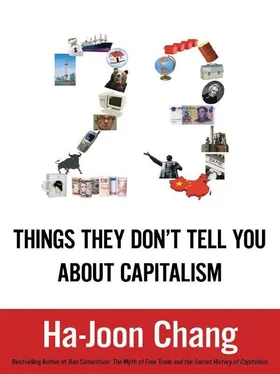This book is not an anti-capitalist manifesto. Being critical of free-market ideology is not the same as being against capitalism. Despite its problems and limitations, I believe that capitalism is still the best economic system that humanity has invented. My criticism is of a particular version of capitalism that has dominated the world in the last three decades, that is, free-market capitalism. This is not the only way to run capitalism, and certainly not the best, as the record of the last three decades shows. The book shows that there are ways in which capitalism should, and can, be made better.
Even though the 2008 crisis has made us seriously question the way in which our economies are run, most of us do not pursue such questions because we think that they are ones for the experts. Indeed they are – at one level. The precise answers do require knowledge on many technical issues, many of them so complicated that the experts themselves disagree on them. It is then natural that most of us simply do not have the time or the necessary training to learn all the technical details before we can pronounce our judgements on the effectiveness of TARP (Troubled Asset Relief Program), the necessity of G20, the wisdom of bank nationalization or the appropriate levels of executive salaries. And when it comes to things like poverty in Africa, the workings of the World Trade Organization, or the capital adequacy rules of the Bank for International Settlements, most of us are frankly lost.
However, it is not necessary for us to understand all the technical details in order to understand what is going on in the world and exercise what I call an ‘active economic citizenship’ to demand the right courses of action from those in decision-making positions. After all, we make judgements about all sorts of other issues despite lacking technical expertise. We don’t need to be expert epidemiologists in order to know that there should be hygiene standards in food factories, butchers and restaurants. Making judgements about economics is no different: once you know the key principles and basic facts, you can make some robust judgements without knowing the technical details. The only prerequisite is that you are willing to remove those rose-tinted glasses that neo-liberal ideologies like you to wear every day. The glasses make the world look simple and pretty. But lift them off and stare at the clear harsh light of reality.
Once you know that there is really no such thing as a free market, you won’t be deceived by people who denounce a regulation on the grounds that it makes the market ‘unfree’ ( see Thing 1 ). When you learn that large and active governments can promote, rather than dampen, economic dynamism, you will see that the widespread distrust of government is unwarranted ( see Things 12 and 21 ). Knowing that we do not live in a post-industrial knowledge economy will make you question the wisdom of neglecting, or even implicitly welcoming, industrial decline of a country, as some governments have done ( see Things 9 and 17 ). Once you realize that trickle-down economics does not work, you will see the excessive tax cuts for the rich for what they are – a simple upward redistribution of income, rather than a way to make all of us richer, as we were told ( see Things 13 and 20 ).
What has happened to the world economy was no accident or the outcome of an irresistible force of history. It is not because of some iron law of the market that wages have been stagnating and working hours rising for most Americans, while the top managers and bankers vastly increased their incomes ( see Things 10 and 14 ). It is not simply because of unstoppable progress in the technologies of communications and transportation that we are exposed to increasing forces of international competition and have to worry about job security ( see Things 4 and 6 ). It was not inevitable that the financial sector got more and more detached from the real economy in the last three decades, ultimately creating the economic catastrophe we are in today ( see Things 18 and 22 ). It is not mainly because of some unalterable structural factors – tropical climate, unfortunate location, or bad culture – that poor countries are poor ( see Things 7 and 11 ).
Human decisions, especially decisions by those who have the power to set the rules, make things happen in the way they happen, as I will explain. Even though no single decision-maker can be sure that her actions will always lead to the desired results, the decisions that have been made are not in some sense inevitable. We do not live in the best of all possible worlds. If different decisions had been taken, the world would have been a different place. Given this, we need to ask whether the decisions that the rich and the powerful take are based on sound reasoning and robust evidence. Only when we do that can we demand right actions from corporations, governments and international organizations. Without our active economic citizenship, we will always be the victims of people who have greater ability to make decisions, who tell us that things happen because they have to and therefore that there is nothing we can do to alter them, however unpleasant and unjust they may appear.
This book is intended to equip the reader with an understanding of how capitalism really works and how it can be made to work better. It is, however, not an ‘economics for dummies’. It is attempting to be both far less and far more.
It is less than economics for dummies because I do not go into many of the technical details that even a basic introductory book on economics would be compelled to explain. However, this neglect of technical details is not because I believe them to be beyond my readers. 95 per cent of economics is common sense made complicated, and even for the remaining 5 per cent, the essential reasoning, if not all the technical details, can be explained in plain terms. It is simply because I believe that the best way to learn economic principles is by using them to understand problems that interest the reader the most. Therefore, I introduce technical details only when they become relevant, rather than in a systematic, textbook-like manner.
But while completely accessible to non-specialist readers, this book is a lot more than economics for dummies. Indeed, it goes much deeper than many advanced economics books in the sense that it questions many received economic theories and empirical facts that those books take for granted. While it may sound daunting for a non-specialist reader to be asked to question theories that are supported by the ‘experts’ and to suspect empirical facts that are accepted by most professionals in the field, you will find that this is actually a lot easier than it sounds, once you stop assuming that what most experts believe must be right.
Most of the issues I discuss in the book do not have simple answers. Indeed, in many cases, my main point is that there is no simple answer, unlike what free-market economists want you to believe. However, unless we confront these issues, we will not perceive how the world really works. And unless we understand that, we won’t be able to defend our own interests, not to speak of doing greater good as active economic citizens.
Thing 1: There is no such thing as a free market
Markets need to be free. When the government interferes to dictate what market participants can or cannot do, resources cannot flow to their most efficient use. If people cannot do the things that they find most profitable, they lose the incentive to invest and innovate. Thus, if the government puts a cap on house rents, landlords lose the incentive to maintain their properties or build new ones. Or, if the government restricts the kinds of financial products that can be sold, two contracting parties that may both have benefited from innovative transactions that fulfil their idiosyncratic needs cannot reap the potential gains of free contract. People must be left ‘free to choose’, as the title of free-market visionary Milton Friedman’s famous book goes.
Читать дальше






![Ally Carter - [Gallagher Girls 01] I'd Tell You I Love You But Then I'd Have to Kill You](/books/262179/ally-carter-gallagher-girls-01-i-d-tell-you-i-lo-thumb.webp)





